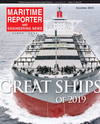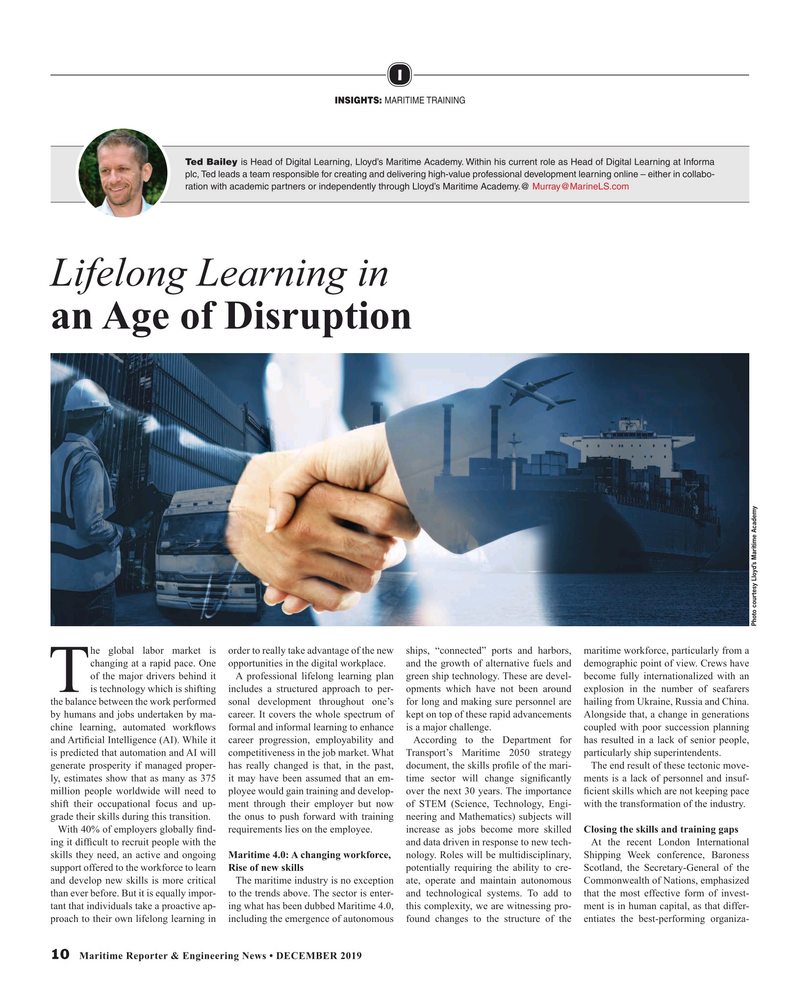
Page 10: of Maritime Reporter Magazine (December 2019)
Great Ships of 2019
Read this page in Pdf, Flash or Html5 edition of December 2019 Maritime Reporter Magazine
I
INSIGHTS: MARITIME TRAINING
Ted Bailey is Head of Digital Learning, Lloyd’s Maritime Academy. Within his current role as Head of Digital Learning at Informa plc, Ted leads a team responsible for creating and delivering high-value professional development learning online – either in collabo- ration with academic partners or independently through Lloyd’s Maritime Academy.@ [email protected]
Lifelong Learning in an Age of Disruption
Photo courtesy Lloyd’s Maritime Academy he global labor market is order to really take advantage of the new ships, “connected” ports and harbors, maritime workforce, particularly from a changing at a rapid pace. One opportunities in the digital workplace. and the growth of alternative fuels and demographic point of view. Crews have of the major drivers behind it A professional lifelong learning plan green ship technology. These are devel- become fully internationalized with an
T is technology which is shifting includes a structured approach to per- opments which have not been around explosion in the number of seafarers the balance between the work performed sonal development throughout one’s for long and making sure personnel are hailing from Ukraine, Russia and China. by humans and jobs undertaken by ma- career. It covers the whole spectrum of kept on top of these rapid advancements Alongside that, a change in generations chine learning, automated work? ows formal and informal learning to enhance is a major challenge. coupled with poor succession planning and Arti? cial Intelligence (AI). While it career progression, employability and According to the Department for has resulted in a lack of senior people, is predicted that automation and AI will competitiveness in the job market. What Transport’s Maritime 2050 strategy particularly ship superintendents.
generate prosperity if managed proper- has really changed is that, in the past, document, the skills pro? le of the mari- The end result of these tectonic move- ly, estimates show that as many as 375 it may have been assumed that an em- time sector will change signi? cantly ments is a lack of personnel and insuf- million people worldwide will need to ployee would gain training and develop- over the next 30 years. The importance ? cient skills which are not keeping pace shift their occupational focus and up- ment through their employer but now of STEM (Science, Technology, Engi- with the transformation of the industry. grade their skills during this transition. the onus to push forward with training neering and Mathematics) subjects will
With 40% of employers globally ? nd- requirements lies on the employee. increase as jobs become more skilled Closing the skills and training gaps ing it dif? cult to recruit people with the and data driven in response to new tech- At the recent London International skills they need, an active and ongoing Maritime 4.0: A changing workforce, nology. Roles will be multidisciplinary, Shipping Week conference, Baroness support offered to the workforce to learn Rise of new skills potentially requiring the ability to cre- Scotland, the Secretary-General of the and develop new skills is more critical The maritime industry is no exception ate, operate and maintain autonomous Commonwealth of Nations, emphasized than ever before. But it is equally impor- to the trends above. The sector is enter- and technological systems. To add to that the most effective form of invest- tant that individuals take a proactive ap- ing what has been dubbed Maritime 4.0, this complexity, we are witnessing pro- ment is in human capital, as that differ- proach to their own lifelong learning in including the emergence of autonomous found changes to the structure of the entiates the best-performing organiza- 10 Maritime Reporter & Engineering News • DECEMBER 2019
MR #12 (10-17).indd 10 12/6/2019 10:17:33 AM

 9
9

 11
11
